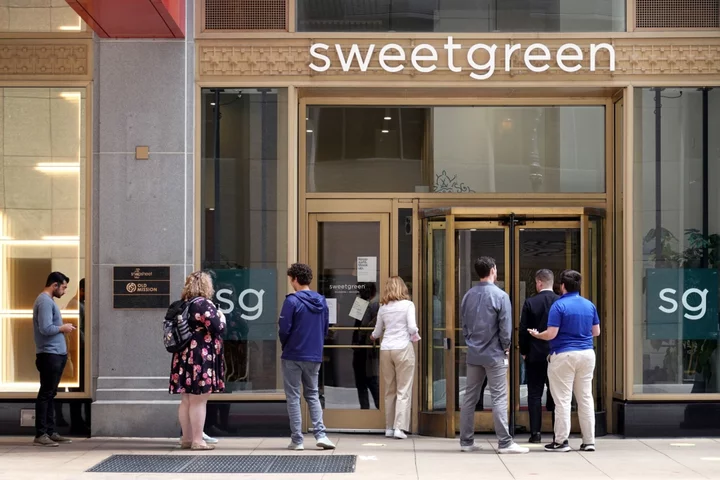A decade ago, Sweetgreen Inc. co-founder Nicolas Jammet couldn’t imagine his salad-focused chain featuring a dish with barbecue sauce. But in mid-June, a chicken salad with just that flavor appeared as a seasonal choice to appeal to a broader set of diners.
Sweetgreen has been expanding beyond city centers after taking a massive hit during the pandemic when office workers stayed home. It’s opening more locations in the US South and Midwest to diversify away from the coasts. And it wants to bring in a wider array of guests, including those looking for heartier meals.
At the core of that effort is the menu, and Sweetgreen recently hired former Burger King Corp. and Chipotle Mexican Grill Inc. executives to help dream up what’s next. The salad shop recently raised its outlook for one measure of earnings after posting its first quarterly profit since going public in November 2021.
Bloomberg recently sat down with Jammet at the chain’s Bowery location in downtown Manhattan to chat about life beyond lettuce.
Sweetgreen is commonly associated with, well, greens. But you’ve expanded beyond that. Why?
We want to have a heartier range of options that appeal to some of our existing customers during different parts of the day, but also to new customers. If you look at our menu over the last 16 years, it has evolved so much. In general over the last couple of years it’s definitely broadened in terms of the “heartiness” scale, with more grains and more proteins.
We just added this Italian chopped salad that has salami, spicy banana peppers and red wine vinaigrette with avocado oil. That appeals to a pork consumer. We also have the barbecue chicken salad. It’s not even a radical menu add. But even seeing that plate evolution speaks to a different customer.
We know the ultimate thing that drives consumer behavior is craveability. The big focus as we expand to more and more places around the country and reach a broader, more mainstream customer, is how do we really add some of those more mainstream flavors and heartier options to our menu?
Do tastes differ much across the country?
Our most popular bowl is the harvest bowl, and we’ve seen that in every region. We spend a lot of time with our customers regionally just understanding them. One of the funny examples: We did tastings for the hot honey chicken plate in Texas and people were like, this is not hot. This is not spicy. We’re like, okay we have chili pepper flakes, you can add them.
How’s the Infinite Kitchen, Sweetgreen’s automated salad machine, doing?
Something that the external world is more concerned about than us is the idea of up time. It hasn’t gone down one day. There’s been a lot of great lessons around how team members are learning to troubleshoot the machine when something does go wrong, like when one of the lanes is overfilled or some part is stuck. And the machine goes so fast that the person doing prep has to keep up with filling it, so we have to think about labor deployment.
We’re three months in, so we’re still learning a ton. We are opening a second one this year in Huntington Beach, California. The idea is more future-focused in general — we don’t have a plan in the next year to like retrofit every store. Still, I think the Infinite Kitchen has the ability to really be a transformational format for us.
What does all this automation mean for how many workers you’ll need in the future?
I don’t know. I think we’re still learning that, because even though it removes certain positions, it also adds certain positions. There’s now a host position. That’s an employee who greets guests and asks: “Have you been here? Do you want to taste something?” That’s helpful because if you’re a brand new customer and you walk into Sweetgreen at peak lunch on a Tuesday, it’s overwhelming.
We also have to teach certain roles, almost like a technician of this automated equipment. We’re still learning the labor model.
A common complaint with online orders is that portions are off or ingredients are missing. What can you do to remedy that?
When someone’s making the order not in front of the customer, it’s just a different dynamic. And ultimately we believe that what you measure will improve. And so we are maniacal about measuring things like accuracy and customer complaints in all the stores. Every store manager gets a scorecard and they see it almost daily that says hey, yesterday we had customer complaints because there’s something missing. It’s a discipline and a lot of the tools we’ve built can help optimize it, but it’s kind of like a reality of human error.
It’s something we can keep improving, but we’ll never get to zero. It’s also part of what gets us the most excited about the Infinite Kitchen. Accuracy is 100% with the machine.
The pandemic transformed consumer behavior. What have you seen lately?
This past year, we’ve been really excited to see a big return to the frontline, meaning in-store orders. We’re seeing some of the delivery channels decline a bit. Some people want food to come to them, but there’s friction with delivery costs. That’s why our Outposts have been so powerful, where we take these shelves and put them in office buildings and it’s a batch order. So it comes to you, but without the delivery fee.
Editor’s note: This conversation has been edited and condensed.
Is the American consumer flush with cash or about to go broke? Share your views in the latest MLIV Pulse survey.
Author: Daniela Sirtori-Cortina

